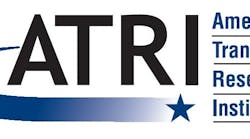The American Transportation Research Institute (ATRI) Board of Directors recently approved the 2018 Top Research Priorities as identified by ATRI's Research Advisory Committee (RAC). ATRI's RAC developed the list of recommended research topics at its meeting held in Dallas in March and the ATRI Board vetted and approved that list at its meeting last week.
The research topics cover a wide array of industry issues including the impact that urban planning and "smart city" design have on truck operations, inconsistencies in CDL testing, and continuing research on the impact of autonomous technologies on the trucking industry.
The 2018 ATRI top six research priorities are:
- Urban Planning and Smart City Design for Trucks: examining how and where truck freight delivery can be effectively incorporated into urban planning and smart city design approaches.
- Assessing the Consistency and Accuracy of CMV Crash Data: will identify ways to improve commercial motor vehicle crash data collection, quality review, data management and data submission at the local and state levels.
- Role and Impact of Government Regulations on Autonomous Vehicles: research will assess the positive and negative impact of regulations being promulgated at the state-level for identification of model legislation on how autonomous technologies and vehicles should be deployed.
- Inconsistencies in CDL Testing: will review the range of requirements for CDL testing across states and identify best practices to develop an effective set of testing requirements.
- Autonomous Impacts on the Truck Driver: a detailed analysis of how autonomous truck technologies will change the operational environment and driving requirements for commercial drivers.
- Best Practices for Cannabis Intoxication Testing: exploring best practices in the U.S. and abroad, the research will benchmark recommended maximum intoxication levels and identify recommendations for driver sobriety testing.



